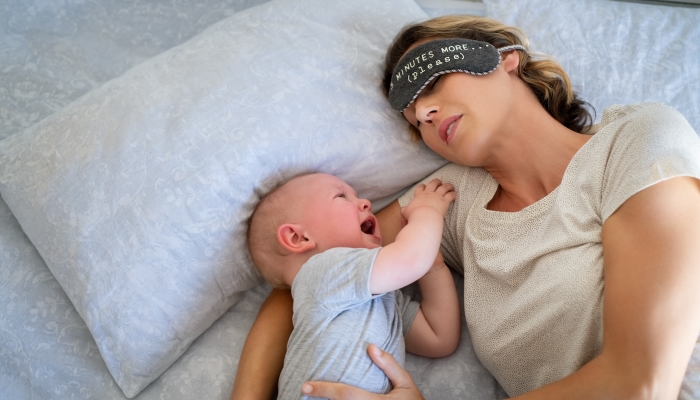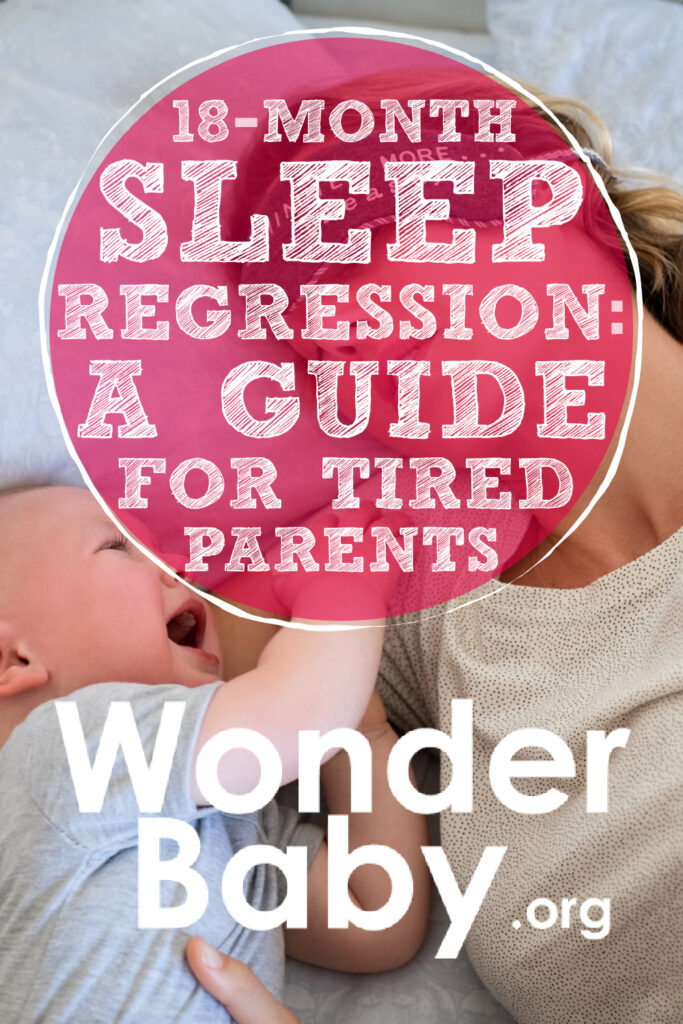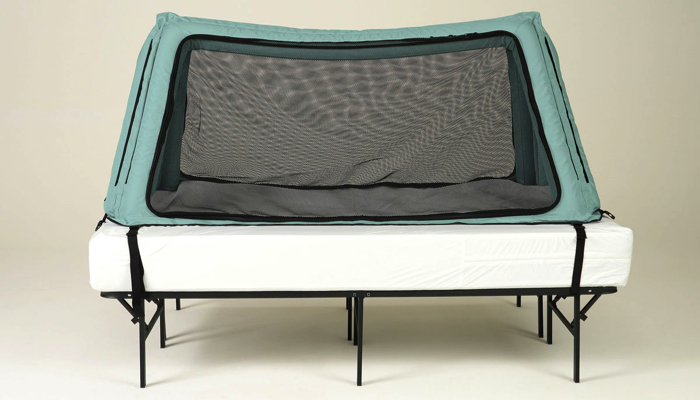18-Month Sleep Regression: A Guide for Tired Parents

- The 18-month sleep regression occurs when your child’s sleep pattern is interrupted.
- There are many causes, but most point toward cognitive and physical development.
- There are plenty of signs of sleep regression, including early wakings, refusal to sleep, and more.
- The 18-month regression can last up to 6 weeks.
- Dropping naps and keeping with routine may help get you through this sleep regression.
I distinctly remember one of the first good nights of rest I experienced as a newer mom.
I’d prepped my bedside with all the essentials—bottle, burp cloth, diaper—and was ready for the sleep disruptions just like every other night. Instead, I woke up to sunlight in an instant panic. Did I not hear her? Was the monitor not charged? Is she okay?
When I ran upstairs, I found her wide awake but content as ever. Finally, she slept through the night, and I was ecstatic.
The joy was somewhat fleeting, though, because my daughter went through just about every sleep regression there is, the 18-month regression included. Her nighttime awakenings came back, along with many sleepless nights.
I won’t lie—it was rough. The adjustment period from no sleep to sleep and back was enough to make me crazy. Luckily, things improved when I started identifying the signs of regression and learning the tricks to help her get back on track to better sleep.
If your little one is experiencing the 18-month sleep regression, don’t sweat it. Learning more about the 18-month-old regression can help you make the best of these sleep issues while prioritizing your child’s growth.
18-Month Sleep Regression: What Parents Need to Know
The 18-month sleep regression is when your otherwise sound sleeper starts waking during the night, straying from their normal nighttime sleep patterns. These regressions can occur throughout your child’s first two years, the most notable sleep regression ages being at the 4, 6, 8, 12, and 18-month milestones. This isn’t to say they experience sleep regression at every single one of these ages.
Some kids experience sleep regressions at multiple milestones, while others experience none—though I suspect your kiddo falls into the former category, which brings you here! The only thing you can count on is varying sleep challenges depending on the child and their age.
According to Jodi Mindell, PhD, in the article titled Development of infant and toddler sleep patterns: real-world data from a mobile application and published in 2016, “Sleep patterns are ever-changing across the first few years with wide individual variability.” The good news is you can rest assured that these sleep interruptions are just temporary changes and not for nothing.

What Causes the 18-Month Sleep Regression?
Cognitive or physical developments usually cause these regressions as your little one continues to learn and grow. Their vocabulary is expanding, they’re coming into their emotions, and they continue to gain more and more mobility.
These toddler growth spurts are a time of development that takes a toll on their bodies and requires a lot of adjustment.
An 18-month regression can also be caused by outside factors such as recent travel or sickness. Learning a new skill can sometimes cause sleep regression, especially at the 18-month milestone. For example, potty training has been known to cause an 18-month sleep regression due to nighttime bathroom trips and re-settling into bed.
Likewise, if your child starts preschool, undergoes a move, switches to a toddler bed, or is experiencing separation anxiety, it could be the root cause of their regression.
How to Tell If Your 18-Month-Old Is Going Through Sleep Regression
It might seem like a no-brainer that your 18-month-old sleep regression is identifiable through your little one’s night waking. While that’s definitely an easy clue to your midnight woes, it’s not the only one! Here are some other regression signs to keep an eye out for:
- Irregular Naps: You may also notice longer naps in the 18-month regression, which can affect nighttime sleep at any age. Some children also cut their naps short or avoid them altogether.
- Early Waking: Sudden early wake times are no fun for anyone, especially if they’re coupled with nighttime wakings. If your 18-month-old is waking too early, it could be sleep regression. Note: Normal wake time is around 7:30 am.
- Separation Anxiety: While separation anxiety can be a symptom of many problems, it could also be a sign of regression. If your child is unusually clingy or becomes upset when you try to leave the room after tucking them in, that’s a good clue they may have separation anxiety.
- Refusal to Rest: A refusal to rest before naps and nighttime sleep is a good sign of regression. If your toddler is all wound up and unable to settle despite their wake time, a regression could be the cause.
- Refusal to Sleep: Behavioral patterns prior to sleep times are common as well. If your child would usually go down easily for naps and nighttime sleep but is now resistant, it could be attributed to the 18-month sleep regression.
How Long Does the 18-Month Sleep Regression Last?
The 18-month sleep regression can last anywhere between 2 and 6 weeks. Probably not the timeframe you were hoping for, I know. The idea of going from a perfectly content sleeper to what feels like the newborn stage (okay, I exaggerate), isn’t the preference of any parent. Even so, it’s a small price to pay for their development.

Parents’ Guide on Getting Through the 18-Month Sleep Regression
We’ve outlined everything you need to know about toddler sleep regression, but we won’t leave you hanging there! It’s time to look into what parents can do to help support their little ones through this time, keeping their sanity along the way.
Take a look at these tips for getting through the 18-month sleep regression:
- Dropping Naps: One way to get through this sleep regression is to consider dropping one of your child’s naps if they’re still taking two naps daily. Daytime sleep tends to interfere with a full night’s sleep, especially with a regression in the mix.
- Keeping Routine: Routine is everything with toddlers. A simple change can throw off their entire schedule. It’s imperative to remain consistent during the 18-month sleep regression to help prevent any further agitation. This includes everything from a normal daytime routine to their sleep schedule.
- Comfort: Sometimes the simplest show of comfort can go a long way with your little one. They may need more pre-bedtime snuggles, an extra book reading, or even a new stuffed animal to keep them company.
- Remain Active: It’s no secret that active kids often make for sound sleepers. Toddler sleep regressions are no exception! Try to remain active or even more active during this time. Busy bodies during the day may help make for better sleepers at night.
- Recognize Drowsiness: Don’t miss your window to put your toddler down when they’re drowsy. The drowsiness will help them in falling asleep on their own without letting them reach the overtired phase, which in my experience leaves little room for cooperative sleep!
- Try Sleep Training: By now, you’ve already sleep-trained, but it might be time to draw on that knowledge again. Many principles built into sleep training methods make great troubleshooting tips during a regression. For instance, wait 5 minutes before responding to a cry, then briefly comfort the child before leaving again.
FAQs
Can the 18-month sleep regression happen early?
The 18-month sleep regression might not show up right at the 18-month milestone. You could see it pop up around 16 months or even just after your little one is already 18 months. Sleep regressions often occur a month or earlier than the common regression milestones (4, 6, 8, 12, and 18 months).
They can also show up later than those markers as well. Since these regressions may not show up exactly on time, it can be hard to identify if your child is experiencing a regression. Monitoring them for the common regression signs above is the best way to figure out exactly what you’re dealing with.
Should you let an 18-month-old cry it out during a sleep regression?
Using the cry it out method, or extinction method, during sleep regression is really a personal choice. If your primary sleep training method before the 18-month regression appeared was the cry it out method, you could continue using this as it will keep your toddler’s bedtime routine consistent. On the other hand, they may resist.
Most parents find success during regressions by offering some sort of comfort to the child in order to get them to fall asleep independently again. Though this tends to go against the principles of the extinction method, it can be a momentary, useful tool as you work through the issues that temporarily disrupt their sleep cycles.
Should I stop sleep training during a regression?
Sleep training can be a tough enough process on its own without battling against a regression. If you’re still working through sleep training issues at 18 months, or earlier depending on when the regression hits, you might be a bit more lax during this time. If your child needs more comfort or sleep incentives, that’s okay!
Put a pause on your strict training schedule and start troubleshooting what you can do to help your child fall asleep now. Once the regression passes, you can pick up where you left off with normal bedtime routines.
When should I contact my doctor with concerns about sleep regression?
As a general rule, never hesitate to call your doctor if you have concerns for your child’s health and well-being. When it comes to the 18-month regression (or any regression for that matter), if you’re seeing it last well over a month go ahead and give them a call. There are some other signs you can keep an eye out for as well!
If your toddler snores very loudly, appears to have abnormal breathing, major changes in behavior, or other signs of sickness like fever, sore throat, and irregular glands, it’s best to take them in. These could be underlying symptoms of a larger problem. When in doubt, call!

Related Posts

Sleep, Special Needs
Safe Place Bedding Travel Bed Review
Traveling with a special needs child can be stressful! Having a safe, durable, and easy to use travel bed can make traveling so much easier!

Sleep, Special Needs
Sleep Regimen for Premature Babies: Special Considerations
It can take premature babies much longer than their full-term peers to sleep for long stretches. A preemie sleep schedule may encourage better sleep.

Sleep
Mastering the Bedtime Routine: 3 Tips for a Peaceful Night’s Sleep
From around six weeks, a newborn bedtime routine can help your baby learn the difference between day and night and prepare for a restful night’s sleep.